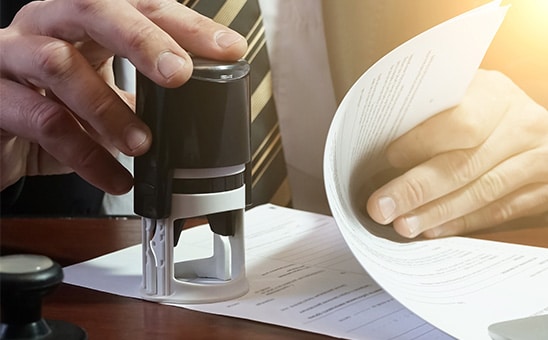Your Brand Matters. Protect It.
If you own a business, there’s nothing that matters more than your brand — and unless you take steps to ensure it is adequately protected, your most valuable asset is also your most vulnerable. It is crucial to register a trademark through the United States Patent and Trademark Office. Without registering a trademark with the USPTO, your intellectual property is left exposed to potential misuse that can damage your company’s reputation and bottom line. A registered trademark is a powerful tool to protect your brand.
Trademark registration can be complex, and having knowledgeable counsel to guide you through the process can help you avoid any hurdles, delays, or complications. The attorneys at the Trademark Lawyer Law Firm, PLLC have decades of combined experience assisting entrepreneurs and business owners in various industries with filing applications for federal trademark registration. Having successfully registered over 6,500 trademarks, our clients know they can rely on our professionalism, efficiency, and skill to safeguard the logo, slogan, or symbol that makes their identity unique.
When Do You Need a Trademark?
It’s never too late — or too soon — to register a trademark. In fact, it’s best to secure your ownership rights as early as possible. Once your trademark is registered with the USPTO, your brand is protected from infringement or competitors who may attempt to harm your business by using similar marks.
Regardless of whether you’ve been using the trademark during the course of business, it must still be properly registered to have the full scope of protection available under federal law. Contrary to what some business owners may think, using the symbol “TM” or “SM” does not provide nationwide protection. These symbols only indicate you are asserting your common law rights to the mark, which may not be enough to prevail in an infringement action. The best way to shield your brand from the actions of wrongdoers is with a registered trademark.
Reliable Trademark Attorneys Guiding You Through the Registration Process
Nearly anything that identifies your brand and distinguishes it from others can be a trademark, such as a word, phrase, slogan, symbol, business or product name, and design. However, in order to have the full legal protection that comes with federal trademark registration, an application must first be submitted to the USPTO. It’s critical to ensure that the trademark is filed correctly — which is not always as simple as merely completing paperwork and paying a fee.
There are numerous legal requirements to be aware of when it comes to trademark registration. There are also specific criteria that must be met to avoid office actions or delay in processing. The trademark application requires you to provide specific information, including:
- A description of the trademark or service mark
- The date the mark was first used
- A description of the services or product applicable to the trademark
- The classification of the trademark
- At least one filing basis
- A depiction of the trademark you wish to register
While the USPTO requires that your mark be used in commerce prior to being granted federal trademark rights, many businesses that are in the initial stages wish to protect their identity from the outset. In these cases, an entrepreneur can safeguard their brand with an Intent to Use application, which effectively serves as a placeholder until the mark is actually in use. We work with entrepreneurs at all phases of business development to create effective and tailored strategies that suit their specific needs.
It’s essential to understand you cannot make material alterations to the trademark application once it has been filed. As part of our trademark registration service, we diligently prepare trademark applications to help ensure the process goes smoothly. Our attorneys will also carefully assess your logo, design, or symbol to determine the probability of successful registration and can work with you to develop a comprehensive solution if any issues arise with your application.
Securing Your Brand with a Registered Trademark
After your trademark application has been filed, a USPTO examining attorney will review the materials you’ve submitted and determine whether your mark meets the criteria for registration. If there are no issues with your mark, it will be published in The Trademark Official Gazette and subsequently registered, barring any successful opposition to your mark.
If there are any problems identified in your application, the USPTO will send you a formal letter — also known as an office action — and allow you to make any necessary corrections.
Common issues with trademark applications can include:
- An overly broad description of goods or services
- Describing the goods or services too narrowly
- Failing to use the mark in commerce
- Submitting a trademark that’s been digitally altered
- Merely descriptive or generic
- Likelihood of confusion with an existing mark
- Lack of distinctiveness
Office actions may be final or nonfinal. Additionally, there are several other office actions — some require responses, and some don’t. Regardless of the type of office action you’ve received, it’s best to have the guidance of an experienced trademark filing lawyer who can help you address the issues. We work closely with our clients throughout the entire trademark registration process to help them achieve a positive outcome and help their businesses thrive.
Schedule a Consultation with a Trusted Trademark Registration Attorney
Your registered trademark is the key to the success and growth of your business and its profit margin. Based in Ann Arbor, Michigan, the Trademark Lawyer Law Firm, PLLC provides a comprehensive trademark registration service for startups, entrepreneurs, and business owners in various industries throughout the country. With a track record of having successfully registered more than 6,500 trademarks with the USPTO, we are dedicated to ensuring that our clients receive superior legal services at reasonable rates. Contact us today to schedule a free 15-minute consultation with a trademark registration attorney.





